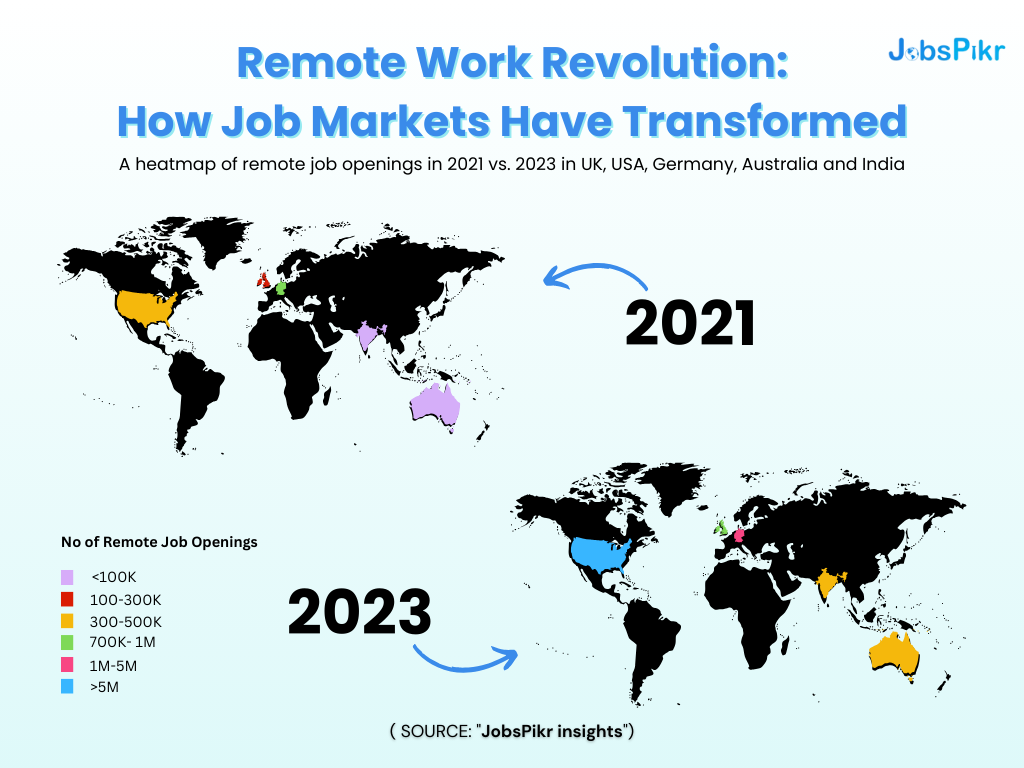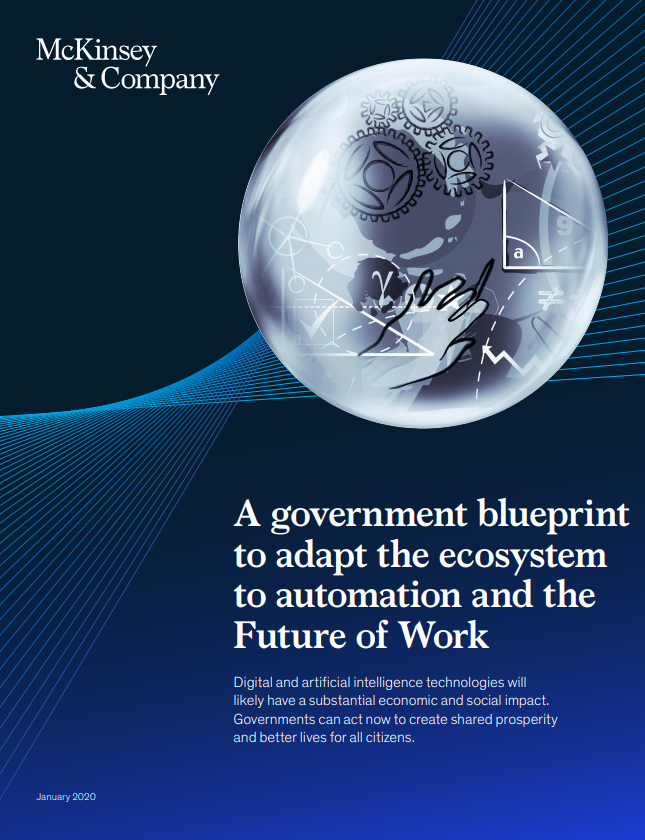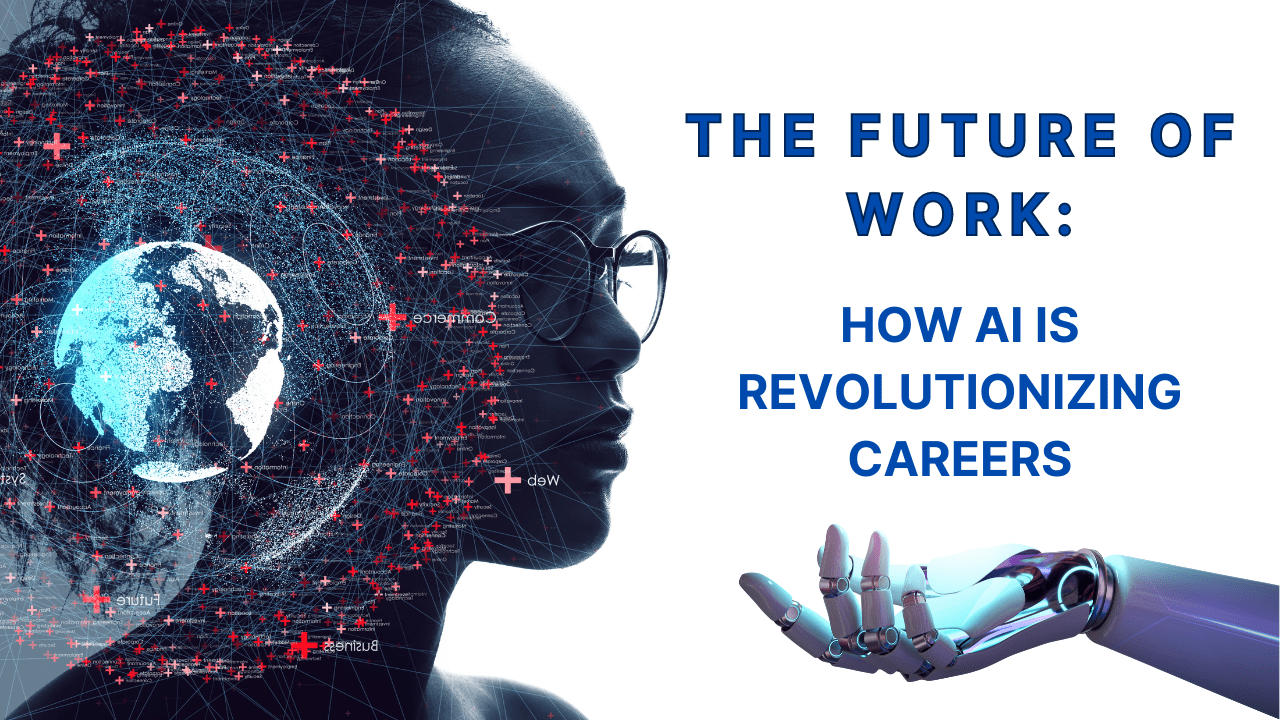The American workplace is undergoing a metamorphosis. Fueled by technological advancements, demographic shifts, and a global pandemic's lingering effects, the "Future of Work" isn't some distant prophecy – it's unfolding right now. This article delves into the key trends shaping the US job market, explores the skills in demand, and offers insights for workers and businesses alike to navigate this evolving landscape.
Table Of Content
Trends Reshaping the American Workplace

1. Automation and Artificial Intelligence (AI):
Robots aren't stealing all the jobs – but they are changing them. Repetitive tasks are increasingly automated, with AI impacting everything from manufacturing to customer service. The good news? AI creates new opportunities – jobs focused on developing, maintaining, and utilizing this technology will be in high demand.
A report by the McKinsey Global Institute explores the potential impact of automation on jobs in the US: https://www.mckinsey.com/~/media/BAB489A30B724BECB5DEDC41E9BB9FAC.ash
2. Rise of the Remote Workforce:
The COVID-19 pandemic normalized remote work, and it's here to stay. A study by Owl Labs indicates 70% of US workers want a hybrid or fully remote model [Source: Owl Labs State of Remote Work 2024]. Companies are embracing the flexibility and cost-savings it offers, while employees value the work-life balance.
3. The Gig Economy and Freelancing:
The traditional 9-to-5 job is no longer the only path. The gig economy, with freelance platforms connecting businesses with independent contractors, is flourishing. This trend caters to those seeking project-based work, offering flexibility and variety.
4. Importance of Soft Skills:
While technical expertise remains valuable, soft skills are increasingly crucial for success. Communication, critical thinking, problem-solving, and teamwork will be essential for navigating complex projects and collaborating effectively in a hybrid or remote work environment.
5. Lifelong Learning:
The pace of change is relentless. To stay relevant, continuous learning is paramount. Whether through online courses, professional development programs, or certifications, upskilling and reskilling will be critical for workers to adapt to evolving job requirements.
6. Focus on Wellbeing and Work-Life Balance:
Burnout is a growing concern. Businesses are recognizing the importance of employee wellbeing, offering benefits that promote mental and physical health. A healthy work-life balance leads to increased employee satisfaction, productivity, and retention.
7. Evolving Nature of Jobs:
Many existing jobs will transform, requiring new skill sets. The World Economic Forum's Future of Jobs Report 2024 predicts up to 25% of jobs will change significantly in the next five years [Source: World Economic Forum Future of Jobs Report 2024]. Workers must be adaptable and willing to learn new skills to stay competitive.
8. The Green Jobs Revolution:
Sustainability is a top priority. The US is investing heavily in green technologies and clean energy, creating new jobs in renewable energy, energy efficiency, and environmental protection.
The US Department of Energy offers resources on workforce development in the clean energy sector: https://www.energy.gov/careers/jobs
9. Focus on Diversity and Inclusion (D&I):
Companies are increasingly recognizing the value of a diverse workforce. Initiatives promoting D&I will not only create a fairer work environment but also foster innovation and unlock new perspectives.
Top In-Demand Skills for the US Workforce in 2024.
Understanding the skills employers seek in the future can help you chart your career path. Here are some of the most sought-after skills in the US:
- Critical Thinking and Problem-Solving: The ability to analyze information, identify problems, and develop effective solutions will be crucial across industries.
- Communication Skills: Strong written and verbal communication are essential for clear and concise information exchange, both in-person and virtually.
- Collaboration and Teamwork: The ability to work effectively with others towards a common goal is vital in a team-oriented work environment.
- Digital Literacy: Understanding technology and being comfortable using various digital tools will be essential for most jobs.
- Data Analysis and Interpretation: The ability to extract insights from data will be valuable in a data-driven world.
- Creativity and Innovation: Thinking outside the box and developing innovative solutions will be key to staying ahead of the curve.
- Adaptability and Lifelong Learning: The willingness to learn new skills and adapt to change will be a key differentiator in the evolving workforce.
- Industry-Specific Skills: In addition to the core skills mentioned earlier, specific technical skills will be crucial depending on your chosen industry. For example, data scientists will need expertise in machine learning and big data analysis, while cybersecurity professionals will require strong knowledge of network security and threat detection.
- Emotional Intelligence (EQ): The ability to understand and manage your own emotions, as well as recognize and respond to the emotions of others, is becoming increasingly important. EQ fosters strong working relationships, promotes empathy, and helps navigate complex workplace situations.
- Cybersecurity Awareness: As our reliance on technology grows, so does the threat of cyberattacks. Understanding basic cybersecurity principles and best practices will be crucial for protecting yourself and your organization's data.
Future-Proofing Your Career in the Age of AI

The future of work presents both challenges and opportunities. Here's how you, as a US worker, can thrive in this dynamic environment:
- Identify Your Transferable Skills: Analyze your existing skills and identify transferable skills applicable to different job roles.
- Embrace Continuous Learning: Enroll in online courses, attend workshops, or pursue certifications to enhance your knowledge and skillset.
- Build Your Network (continued): Connect with professionals in your industry and develop strong relationships. Networking events, online communities, and professional organizations can all be valuable resources.
- Develop Your Personal Brand: Create a strong online presence showcasing your skills and experience. Utilize platforms like LinkedIn to build your professional reputation.
- Stay Informed: Keep abreast of industry trends and emerging technologies to understand how they'll impact your field.
- Be Flexible and Open to Change: View change as an opportunity for growth. Be willing to explore new opportunities and adapt to new work environments.
- Advocate for Yourself: Negotiate your salary and benefits with confidence. Understand your worth and communicate your value proposition effectively.
- Focus on Wellbeing: Prioritize your mental and physical health. Maintain a healthy work-life balance to avoid burnout and ensure long-term career success.
Emerging Job Markets

The future of work will see the rise of entirely new job markets driven by technological advancements and societal shifts. Here are some areas with high growth potential:
- Artificial Intelligence (AI) and Machine Learning (ML): As AI and ML become more sophisticated, a growing number of jobs will be related to developing, implementing, and managing these technologies. This includes roles like AI ethicists, data scientists, and machine learning engineers.
- Cybersecurity: With the ever-increasing threat of cyberattacks, the demand for cybersecurity professionals will continue to surge. Jobs in network security, threat intelligence, and vulnerability analysis will be in high demand.
- Big Data Analytics: The ability to extract insights from massive datasets will be crucial for businesses across industries. Data analysts, data scientists, and business intelligence specialists will be key players in this field.
- Renewable Energy and Sustainability: The transition towards a greener economy will create numerous jobs in areas like solar energy, wind power, energy efficiency, and environmental protection.
- Automation and Robotics: While automation may displace some jobs, it will also create new ones focused on designing, developing, maintaining, and managing robotic systems.
The Gig Economy and Freelancing

The gig economy and freelancing offer significant flexibility and autonomy for workers. However, it's important to consider the challenges as well. These can include:
- Income Inconsistency: Freelancers may face fluctuating income depending on project availability.
- Lack of Benefits: Many freelance platforms don't offer traditional employee benefits like health insurance or paid time off.
- Self-Discipline: Freelancers need strong self-management skills to stay organized, meet deadlines, and manage their workload effectively.
The Role of Government

The US government has a crucial role to play in shaping the future of work. This can involve:
- Investing in Education and Training: Government initiatives can support programs that equip workers with the skills needed for in-demand jobs.
- Creating a Social Safety Net: As the nature of work evolves, ensuring access to healthcare, unemployment benefits, and other social safety nets is critical for workers navigating career transitions.
- Regulating the Changing Workplace: Developing regulations to address issues like worker classification, data privacy, and workplace safety in the context of remote work and the gig economy is crucial.
The Future of Work for US Businesses

The future of work presents both opportunities and challenges for US businesses as well. Here are some key considerations:
- Investing in Upskilling and Reskilling: Providing opportunities for employees to develop new skills will help bridge the skills gap and prepare them for future challenges.
- Embracing Flexible Work Arrangements: Offering remote or hybrid work options can attract and retain top talent, improve employee satisfaction, and enhance productivity.
- Promoting Diversity and Inclusion: Creating a culture that embraces diversity and fosters inclusion will lead to a more creative, innovative, and successful workforce.
- Leveraging Technology: Implementing automation and AI solutions can streamline processes, improve efficiency, and free up human capital for more strategic tasks.
- Prioritizing Employee Wellbeing: Investing in employee wellness programs can improve morale, reduce absenteeism, and boost employee engagement.
- Adapting to the Evolving Regulatory Landscape: Staying informed of and adapting to new labor laws and regulations related to remote work, data privacy, and employee rights is crucial.
Conclusion: The Future of Work is Now
The future of work in the US is a dynamic landscape. By understanding the trends, acquiring in-demand skills, and embracing lifelong learning, both workers and businesses can thrive in this evolving environment. The key is to be adaptable, proactive, and invest in continuous growth. The future of work is not something to fear, but an exciting opportunity to create a more innovative, inclusive, and successful American workforce.
The future of work in the US is a complex and ever-evolving landscape. However, by understanding the trends, developing the necessary skills, and embracing lifelong learning, individuals and businesses alike can not only adapt to this dynamic environment but also thrive in it. The future of work promises to be a period of significant transformation. By approaching it with a spirit of collaboration, innovation, and a commitment to building a more inclusive and sustainable economy, the US can ensure that everyone benefits from the opportunities it presents.

